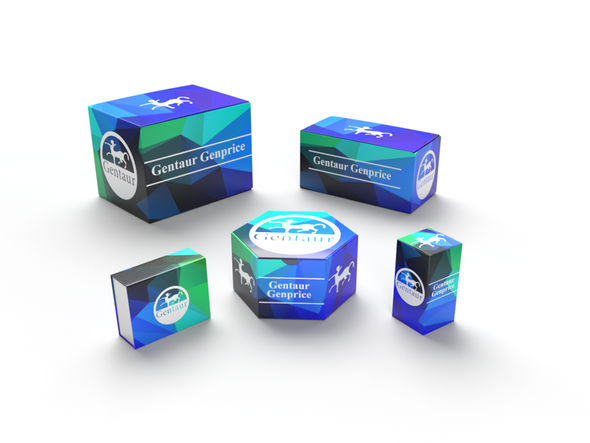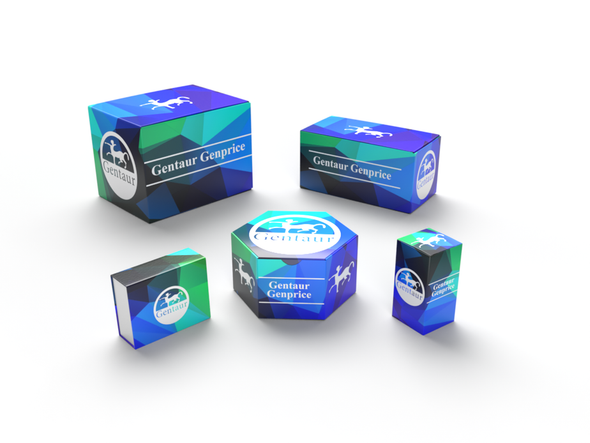749
Mouse Proline-rich protein 15 (PRR15) ELISA Kit | KTE71433
- SKU:
- 749-KTE71433
- Availability:
- Usually ships in 5 working days
Description
Mouse Proline-rich protein 15 (PRR15) ELISA Kit | KTE71433 | Gentaur UK, US & Europe Distribution
Application: This Mouse Proline-rich protein 15 (PRR15) ELISA Kit employs a two-site sandwich ELISA to quantitate PRR15 in samples. An antibody specific for PRR15 has been pre-coated onto a microplate. Standards and samples are pipetted into the wells and anyPRR15 present is bound by the immobilized antibody. After removing any unbound substances, a biotin-conjugated antibody specific for PRR15 is added to the wells. After washing, Streptavidin conjugated Horseradish Peroxidase (HRP) is added to the wells. Following a wash to remove any unbound avidin-enzyme reagent, a substrate solution is added to the wells and color develops in proportion to the amount of PRR15 bound in the initial step. The color development is stopped and the intensity of the color is measured.
Detection Method: Colorimetric
Conjugate: N/A
Sample Type: Cell culture supernatants#Serum#Plasma#Other biological fluids
Assay Type: Multiple steps standard sandwich ELISA assay with a working time of 3-5 hours. It depends on the experience of the operation person.
Kit Component: • Mouse Proline-rich protein 15 microplate
• Mouse Proline-rich protein 15 standard
• Mouse Proline-rich protein 15 detect antibody
• Streptavidin-HRP
• Standard diluent
• Assay buffer
• HRP substrate
• Stop solution
• Wash buffer
• Plate covers
Features & Benefits: Mouse Proline-rich protein 15 (PRR15) ELISA Kit has high sensitivity and excellent specificity for detection of Mouse PRR15. No significant cross-reactivity or interference between Mouse PRR15 and analogues was observed.
Calibration Range: Please inquire
Limit Of Detection: Please inquire
Usage Note: • Do not mix components from different kit lots or use reagents beyond the kit expiration date.
• Allow all reagents to warm to room temperature for at least 30 minutes before opening.
• Pre-rinse the pipet tip with reagent, use fresh pipet tips for each sample, standard and reagent to avoid contamination.
• Unused wells must be kept desiccated at 4 °C in the sealed bag provided.
• Mix Thoroughly is very important for the result. It is recommended using low frequency oscillator or slight hand shaking every 10 minutes.
• It is recommended that all samples and standards be assayed in duplicate or triplicate.
Storage Instruction: The unopened kit should be stored at 2 - 8°C. After opening, please store refer to protocols.
Shipping: Gel pack with blue ice.
Precaution The product listed herein is for research use only and is not intended for use in human or clinical diagnosis. Suggested applications of our products are not recommendations to use our products in violation of any patent or as a license. We cannot be responsible for patent infringements or other violations that may occur with the use of this product.
Background: Proline rich 15 (Prr15), which encodes a protein of unknown function, is expressed almost exclusively in postmitotic cells both during fetal development and in adult tissues, such as the intestinal epithelium and the testis. Prr15/PRR15 expression was consistently observed in mouse gastrointestinal (GI) tumors caused by mutations in the Apc gene, as well as in several advanced stage human CRCs. In contrast, no Prr15 expression was detected in intestinal tumors derived from mice carrying mutations in the Smad3, Smad4, or Cdkn1b genes. These findings, combined with the fact that a majority of sporadic human CRCs carry APC mutations, strongly suggest that the expression of Prr15/PRR15 in mouse and human GI tumors is linked, directly or indirectly, to the absence of the APC protein or, more generally, to the disruption of the Wnt signaling pathway.
Alternative Names: PRR15
Search name: PRR15
Tag: PRR15










